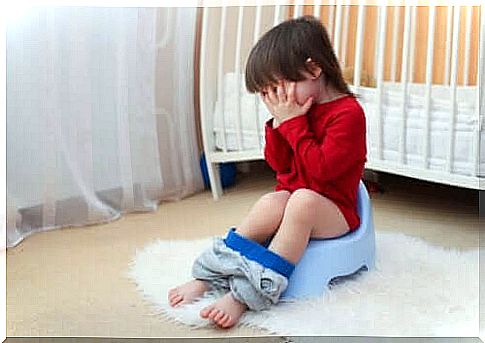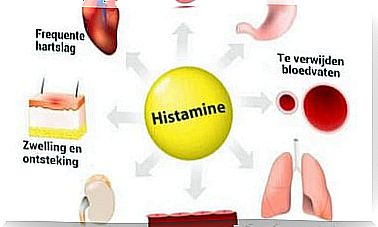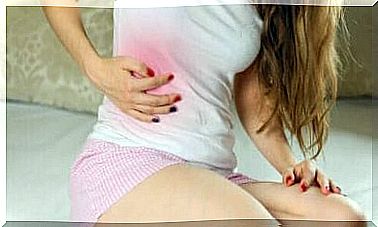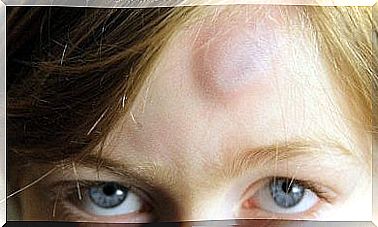Preventing Nausea And Vomiting In Babies

Nausea and vomiting are common in infants. In fact, it’s quite normal for them to experience gastroenteritis at some point. Of course, this kind of inconvenience still worries parents. Today, therefore, we will tell you how to help prevent frequent vomiting in babies. In this article we also explain what it is, why it happens and how to deal with it.
Nausea and vomiting
First of all, it is important to know the difference between vomiting and regurgitation. Vomiting is the coming out through the mouth of food that has been consumed. This is involuntary and requires effort. Regurgitation, on the other hand, occurs when a baby eats too quickly and swallows air. As a result, the food returns effortlessly to the mouth.
It is for this reason that it is quite difficult to distinguish between vomiting and regurgitation. Vomiting can occur at any age, but regurgitation is especially common in infants.
In general, you could say that vomiting is helpful. It’s a way to eliminate food that didn’t fall right or was harmful at the time. However, it can lead to serious problems such as dehydration if you don’t take the right measures.
The Causes of Nausea and Vomiting in Children

As for the causes of nausea and vomiting, they depend on the age of the child. However, there are two common reasons for vomiting in babies:
- Gastroenteritis: This is an intestinal virus that causes diarrhea and vomiting.
- Gastroesophageal Reflux: This happens when the baby’s sphincter is still maturing, not relaxing and making it difficult for food to pass through. This causes reflux and vomiting as a result. It usually lasts until after the age of 12 months.
Other less common causes may include:
- Food intolerance or allergies to, for example, lactose.
- Metabolic diseases.
- Intussusception.
For all these reasons, you should consult your pediatrician so they can help you identify the causes and start treatment as soon as possible.
What should you pay attention to?
Although vomiting may go away on its own, there are certain symptoms to be aware of. So take your child to the doctor or pediatrician if you notice any of these symptoms:
- Vomiting after a blow to the head.
- There is blood in the vomit (it may be brownish in color).
- The child vomits for a long period of time.
- There is lethargy or apathy. However, some babies may show irritability and sadness.
- Abdominal pain and abdominal swelling.
- Bloody stools.
- The vomit is green or yellowish.
- The child is feverish.
Therapy
Rehydration with electrolytes is the most appropriate measure to prevent complications in case of frequent vomiting. Keeping or rehydrating your child is the first step to take if your child is vomiting.
To do this, it is best to follow your pediatrician’s instructions. Depending on the age of the child, the doctor may prescribe an electrolyte drink or a liquid diet until the child recovers. Whatever the treatment will be, apply it slowly so that the child does not reject it.
At that point, it’s also important to remember not to force a sick child to eat. Wait for the child to get hungry again. If your child has not vomited for 8 hours, you can start introducing a light diet such as broths, soups and bread again when the child is older than 1 year. If you are still breast-feeding your child, do so.
Prevention of frequent nausea and vomiting in children
To prevent vomiting, you need to avoid all possible causes. As you have seen, this would be impossible. However, in case of gastroesophageal reflux, it is possible to take some actions against the presence of reflux and vomiting:
- Let your baby burp after every meal. This is the way to eliminate the gases that could cause regurgitation or vomiting.
- Change your child’s diet. If you’re still breastfeeding, remember that cutting certain foods out of your own diet will help your baby and make him or her less prone to vomiting and belching.
- Consult the pediatrician if you give your baby formula milk so that a different formula can be prescribed.
- Feed your child in a position that allows the downward movement of food (vertical position). Do not rock or move the child too much after eating.
- Try to feed slowly. This is especially important if you are bottle feeding. Make sure that the teats are adequately pierced. The little one can drink too quickly or no liquid can come out of the bottle at all while sucking.
- If you are breastfeeding, feed the baby more often but for a shorter amount of time. In this way, the child does not have to process too much food and it does not remain in the stomach for too long.
Conclusion
Vomiting is not something rare in infants. You should, however, be alert and try to determine whether alarms indicate complications or serious problems. Finally, remember to keep your child well hydrated if they are vomiting. As usual, consult your doctor and always follow the instructions.









